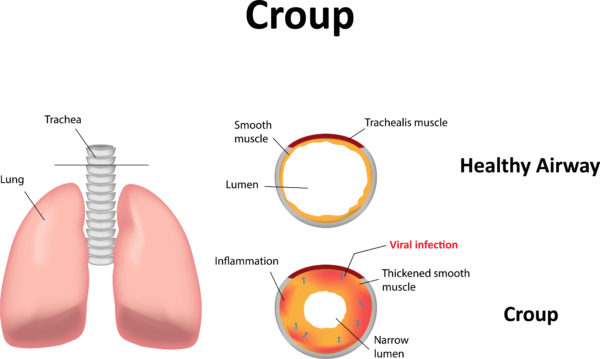As the colder air blows in for the fall and winter months, so do the coughs, sniffles, and sneezes. Croup is most common in these months and may cause a variable amount of respiratory distress to your child, with most of its symptoms worsening through the night or within a brief period.
What is Croup?
Croup is a common viral infection that can be caused by the parainfluenza virus or an allergic reaction. Allergic Croup is usually very sudden in onset and will not cause fever. Infectious croup is generally preceded by cold symptoms and fever. Both can cause inflammation of the voice box (Larynx) and windpipe (Trachea). The swelling causes the airway to become obstructed, causing rapid or labored breathing, hoarseness, and the familiar “barking seal” cough. The most obvious sign that your child may have croup is by the sound of the cough. Most often it is described as sounding like a dry, barking, or a seal-like cough. Other symptoms may include cold-like symptoms, fever, and difficulty breathing. Symptoms of croup may improve during the day but worsen at night while they are lying down.
Who can get Croup?
In adults, the viral infection is very contagious but because adult airways are larger their symptoms are hoarseness and cough. Croup is typically found in children between the ages of three months and five years of age. As children grow and their airways expand, they become less susceptible to the symptoms of the illness.
How is it spread?
Croup cannot be spread. It is merely the reaction to the viral infection parainfluenza. Parainfluenza can be spread from person to person by sneezing and coughing. Your child can also contract the viral infection by touching a contaminated area.
Treatment
To help with coughing episodes or breathing attacks at home:
- Make sure your child drinks plenty of fluids
- Keep your child calm and upright by offering attention and support (crying may make croup worse).
- Use a cool mist humidifier in the child’s room (cold air can help sooth swelling in the airways).
- You may use an over the counter medicine like acetaminophen to help reduce fever and ease the pain. Consult your child’s Primary Care Physician on how much to give and follow their directions carefully.
If you think your child may have croup, you can make an appointment with their primary care provider! If they are unavailable, please feel free to bring them to Little Spurs Pediatric Urgent Care. We have ten locations in San Antonio and two locations in Houston. Our clinics are open seven days a week; Mon- Fri 9a-9p, Sat 9a-6p, and Sun 10a-6p; and can be seen on a walk-in basis.




